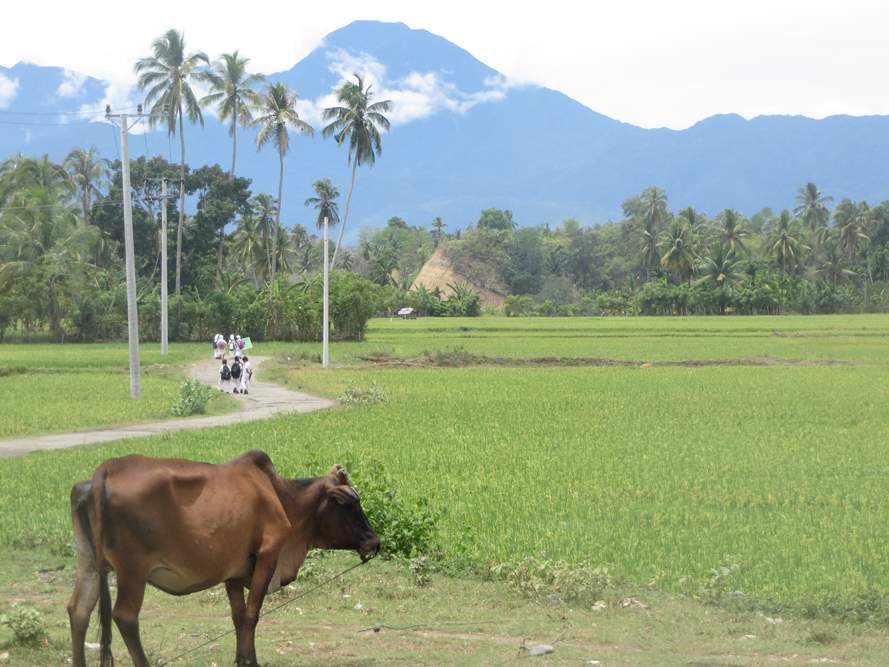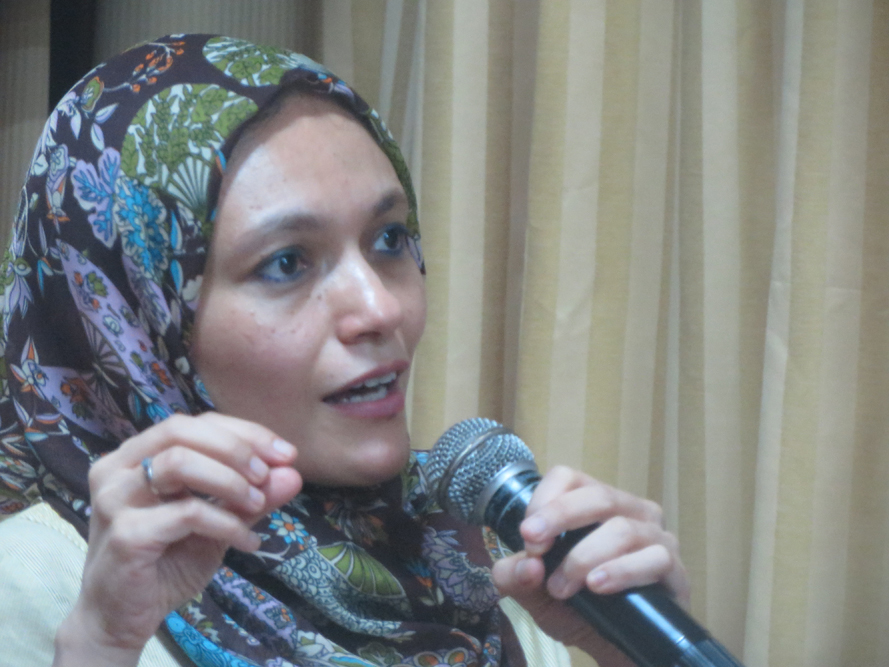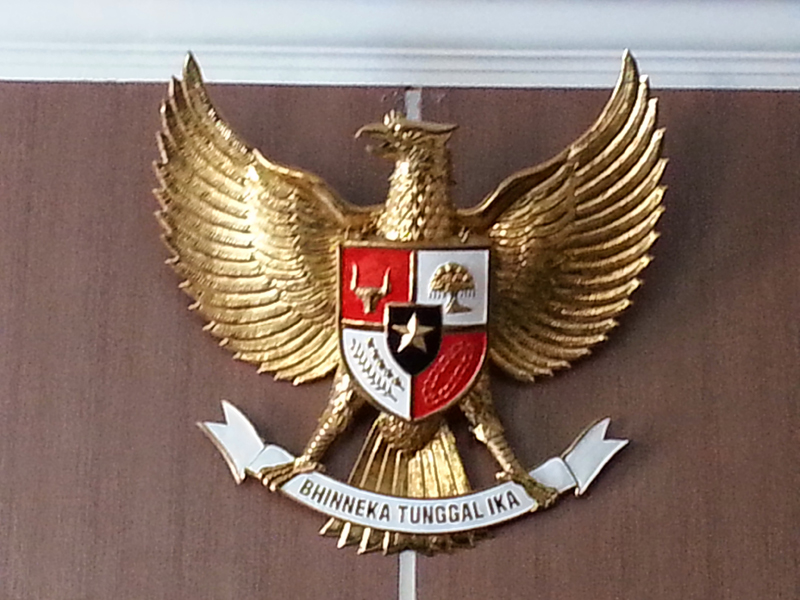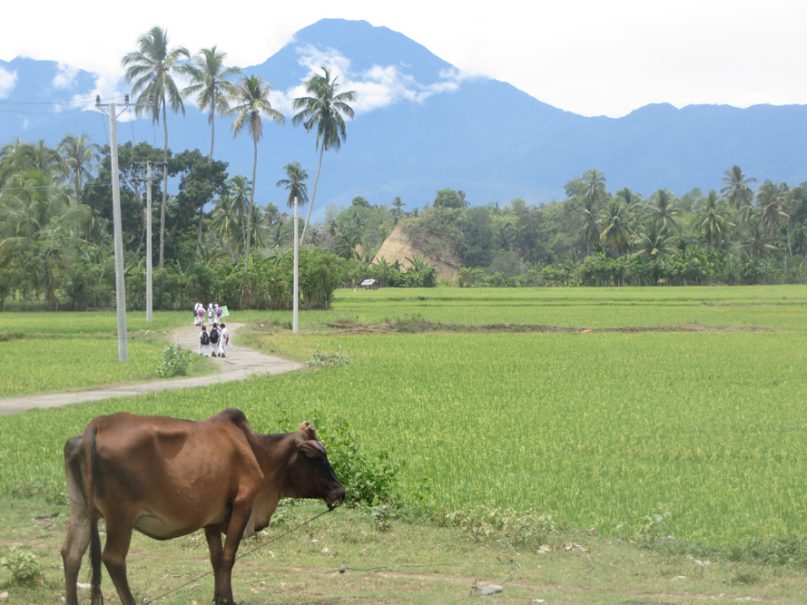(Travelblog is an occasional series of posts by RNS Editor-in-Chief Kevin Eckstrom, who’s on the road in Boston, Honolulu, Jakarta and Banda Aceh with the 2014 Senior Journalists Seminar, sponsored by the East-West Center in conjunction with the U.S. State Department)
BANDA ACEH, Indonesia (RNS) Chances are if you’ve heard of this remote city at the northwestern tip of Sumatra, you probably know it for one or two things: The devastating 2004 tsunami, or Shariah law.
On the first score, it’s hard to tell that the flat coastal plains of Aceh province were ever swallowed by 30-foot waves on the day after Christmas. Mature trees look like they were planted longer than 10 years ago, and rebuilding projects have repopulated villages and neighborhoods once lost to the devastating waves.

(RNS) Students walk home from a madrassa in rural Aceh Besar, Indonesia, where Shariah law was imposed in 2001. Photo by Kevin Eckstrom.
Indeed, the most visible reminders of the tsunami are the two ships that washed ashore more than three miles inland when the seas rose — one is still perched atop an abandoned house, the other takes up several blocks in a leafy downtown neighborhood. Both stand as somber memorials to the 230,000 or more lives lost.
While the tsunami story has been told and retold, less clear is the story of Shariah in Aceh province — and it’s a telling lesson that what we think we know of Islamic law is often more complicated and nuanced than the reality.
Here’s the basic facts about how Aceh became the only province in the world’s most populous Muslim nation to impose Shariah:
- Long before modern Indonesia claimed independence in 1945, Aceh was an autonomous kingdom that chaffed under Dutch colonial overlords for centuries. Most recently — particularly since 1976 — Aceh waged a bloody battle for independence from the Indonesian government in Jakarta, 1,100 miles away.
- With both sides weary of fighting, Jakarta offered Aceh a form of autonomy in 2001 — coupled with the imposition of Shariah law. Government ministers claimed Aceh wanted Islamic law; Acehnese say they never asked for it. Either way, it was a package deal.
- When both sides signed a formal Memorandum of Understanding ending hostilities in 2006, Shariah was not part of the peace deal, but it was already a reality on the ground.
“Shariah was given by the Indonesian government … in order to shake hands with the past,” said Sadia Marhaban, a womens rights activist who helped broker the 2006 agreement in Helsinki.

(RNS) Sadia Marhaban is a women’s rights activist in Banda Aceh, Indonesia, where Shariah was imposed in 2001. Photo by Kevin Eckstrom.
But why was Shariah introduced in the first place? Simple: politics. Government officials in Jakarta were trying to delegitimize the separatist movement in Aceh, and by linking them with images of hard-line Islamic law, Jakarta calculated that the rebels would lose support at home and (especially) abroad. “The problem with Shariah law is not Shariah law itself, but that it is intertwined with politics,” Marhaban said.
Fast forward to today and Shariah is a daily fact of life in Aceh. But what does that actually mean?
For one, alcohol is hard to find, and public drunkenness is punishable by 40 lashes (how intense of a lash may be a matter of dispute between one end of the whip and the other). Intimate relations between unmarried adults can get you nine lashes, and gambling between 12 and 16. All Muslim women must wear a hijab in public. According to the Shariah Court, 53 cases were heard last year, down from 72 in 2012.
In more extreme (and rare) cases, human rights activists say women have been raped for suspected adultery, and proposals for implementing Shariah law have ranged from forcing women to ride side-saddle on motorbikes to requiring four witnesses to prove a rape.
But it’s important to note that Shariah law is only applied to Muslims; there is little to no threat of foreigners or non-Muslims being subjected to Shariah punishments. If you want a beer at your hotel, you can easily find one. Non-Muslim women can walk freely with their heads uncovered (except in a mosque).

(RNS) The state seal of Indonesia looms above the Shariah courtroom in Banda Aceh, where Shariah was implemented in 2001. Photo by Kevin Eckstrom.
It looks like Shariah is probably here to stay — last year the Pew Research Center found that 72 percent of Indonesians favor making Shariah the official law of the land (athough Islam is practically the state religion in all but name anyway).
But here’s the critical part: Shariah here is vastly different from the harsh image of Shariah we see on TV. Across Southeast Asia, most people (84 percent) want Shariah to handle family law, according to Pew. But support for the corporal punishment for criminals (46 percent) or executing Muslims who renounce the faith (27 percent) is dramatically lower than in the Middle East or in hotspots like Pakistan.
The bottom line is that the imposition of Shariah was a cynical political ploy — and it worked. There were, and are, no wild-eyed fanatics seeking to impose their religious laws on other faiths. There is no Taliban running amok, guns blazing. Here, at least, Shariah mostly works in a democratic context, however imperfectly.
Back in America, a handful of states have moved to ban “foreign laws” from the courts — and by “foreign laws” they really mean Shariah. That, too, is a cynical political ploy designed to rally the base and alienate the opposition.
Too often, when we talk about Islam, we overlap religion with politics, or we see Islam through the distorted lens of Middle East turmoil or puritanical Arab culture. Still reeling from the trauma of 9/11, we project our own fears and misconceptions onto others, sometimes for our own purposes (political or otherwise).
Let’s be clear: Islam has its share of problems, as does Shariah. But often what we try to ban is the very same thing we do not understand. We see things in extremes, and fail to consider political, cultural or historical factors that shape the current context. When you pull back the veil a bit, you may be surprised by what you find.
EARLIER TRAVELBLOG POSTS:
- Hipster Hijabs: How we view the headscarf may tell as more about how we view Muslims
- 3 things Indonesia can teach the Muslim world: The Islam we see out of the Middle East may be skewed
- Are you a Christian? What do we mean when we ask questions like that?
- Hate speech, the First Amendment and religious sensitivity. Hate speech is an amorphous beast. Who defines it?





